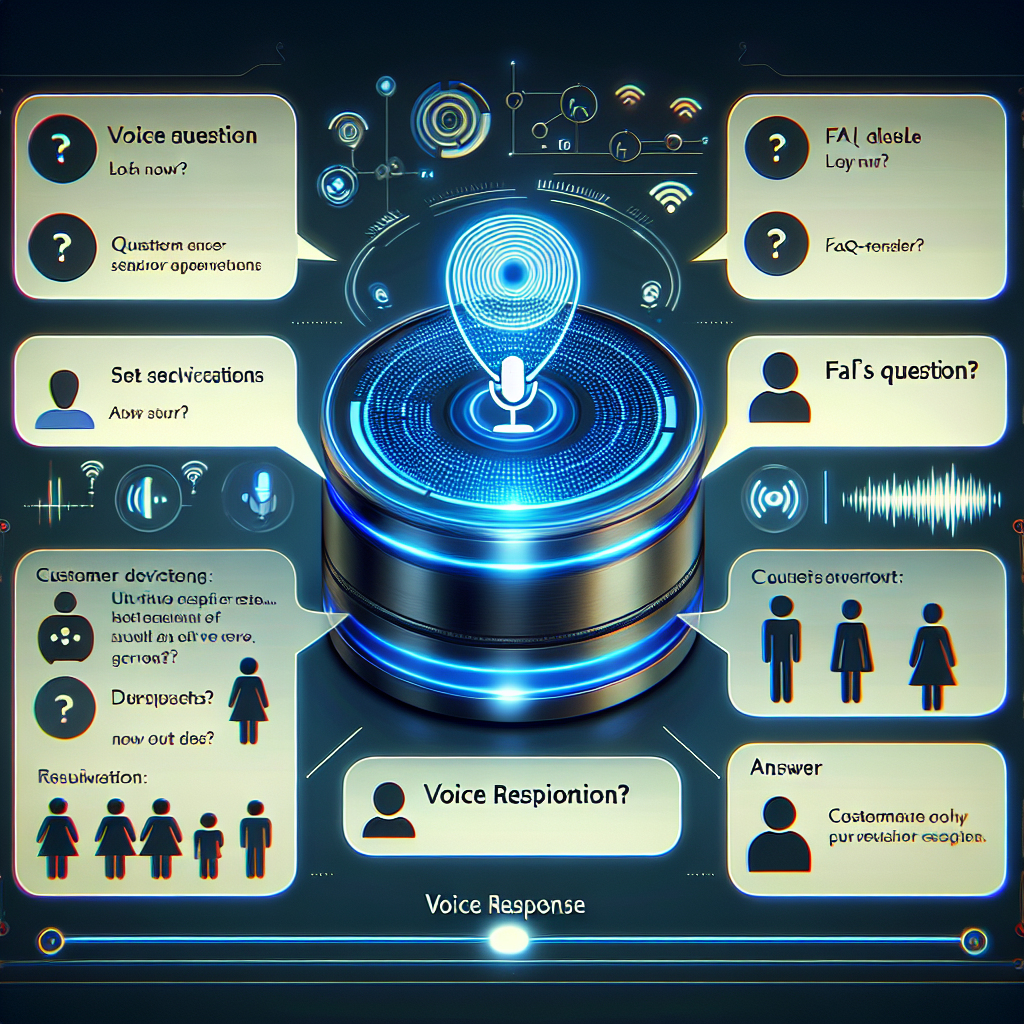
In the current era of digital transformation, businesses are continually evolving to meet the needs of their customers. One revolutionary breakthrough in customer service technology is the introduction of voice-activated FAQ systems. These systems leverage advanced speech recognition and artificial intelligence to enhance self-service options for users.

Voice-activated FAQ systems are a part of the broader voice user interface (VUI) technology that has seen exponential growth in the past few years. Their primary purpose is to provide immediate, accurate responses to users' frequently asked questions, achieving this by interpreting voice inputs and fetching relevant information from a stored database. This not only expedites the process but also offers an 'on-demand' service experience to users.
These systems emerged as a part of conversational AI solutions, designed to offer a more personalized and responsive system of engagement. Businesses of all sizes can greatly benefit from integrating voice-activated FAQ systems into their operations, as they help improve the speed and quality of service while reducing overall operational costs. They are often used in customer support departments, where they assist in handling routine queries and easing the burden on customer service representatives.
In conclusion, voice-activated FAQ systems are a progressive leap in modern customer service technology. They signify a shift towards more consumer-friendly self-service options that prioritize ease of use and efficiency. As technology continues to advance, these systems will undoubtedly become increasingly sophisticated, further enhancing the customer service landscape.
At the heart of all Voice-Activated FAQ Systems are two key technological concepts: Artificial Intelligence (AI) and Natural Language Processing (NLP). Together, they enable these systems to be more efficient, offer richer user experiences, and significantly enhance self-service options.
AI is the broader concept. It refers to the simulation of human intelligence processes by machines, especially computer systems. These processes include learning (the acquisition of information and rules for using the information), reasoning (using the rules to reach approximate or definite conclusions), and self-correction. In the context of voice-activated FAQ systems, AI powers the ability to understand queries and provide accurate answers.
On the other hand, NLP is a subset of AI that focuses on the interaction between computers and humans. It allows machines to understand and respond to voice or text inputs in natural human languages. NLP makes it possible for voice-activated FAQ systems to interact with users in a way that feels intuitive and natural, rather than forcing users to communicate in a machine-centric manner.
In essence, AI and NLP come together to make voice-activated FAQ systems more than just a simple question-answer tool. With AI’s data comprehension ability and NLP’s user-friendly interaction, these systems can understand, learn from, and even predict user needs, thereby elevating the quality and speed of issue resolution.
Every customer interaction with a voice-activated FAQ system contributes to the system's knowledge base, helping it to improve over time. As these systems gain popularity due to their immense potential, companies investing in AI and NLP technologies are helping to shape a future where customer service is more seamless, self-reliant, and cognitively interactive.
In the ever-evolving realm of customer service, technology has brought forth ways in which businesses can better engage with their clientele. One such innovation is the Voice-Activated FAQ System, taking self-service options to greater heights.

Voice-Activated FAQ systems involve the use of Artificial Intelligence (AI) and Natural Language Processing (NLP) to facilitate customer interaction without the need for human intervention. This technological leap offers a host of benefits that are revolutionizing the world of customer service.
Firstly, the implementation of Voice-Activated FAQ Systems drastically reduces operational costs. These systems can handle a high volume of customer queries without needing additional human resources, thus leading to substantial cost savings. Moreover, they are available round the clock, ensuring that customers receive immediate responses regardless of the time of day.
Secondly, these systems are a major boon in enhancing customer satisfaction. By offering instant and accurate responses, they empower customers to resolve their issues swiftly and efficiently. The quality and relevancy of responses delivered by these systems is now more reliable than ever, thanks to advances in AI and NLP techniques.
Finally, Voice-Activated FAQ Systems can significantly streamline service processes. They can simultaneously handle numerous queries, thus eliminating long queues and wait times. These systems also allow businesses to focus on more complex customer concerns, while the automated system takes care of routine queries and requests.
In conclusion, Voice-Activated FAQ Systems represent the future of self-service options, offering benefits that spell immense value for businesses and customers alike. Their adoption continues to rise, hinting at an exciting future where automation and intelligent systems blend seamlessly with the customer service landscape.
As industries continue to transform digitally, companies are seeking innovative approaches to improve their customer service offerings. One such approach is the adoption of Voice-Activated FAQ Systems. These platforms have become significant in enhancing self-service options and delivering personalised customer experiences.
Voice-Activated FAQ Systems are designed with compatibility in mind. They can easily adapt to and integrate with existing customer relationship management (CRM) systems and data analysis tools. This harmonious interconnection between systems allows for a seamless experience, not just for customers but also for customer service representatives.
The interconnection allows FAQs to be updated real-time with data coming from the CRM system. For example, customer queries, product updates, and service changes can all be sourced directly from the CRM and incorporated into the Voice-Activated FAQ system. This ensures that the information relayed to customers is always updated and accurate, thereby circumventing potential misinformation and the subsequent customer dissatisfaction.
Similarly, the integration means that any interaction with the voice-activated FAQ system can feed back into the CRM. This allows for more extensive data analysis, providing insights into customer behaviours, common questions, and feedback. These insights can be used to continually improve both products and services.
In conclusion, Intelligent Voice-Activated FAQ systems not only enhance the self-service options available to customers, but also allow businesses to harness their existing CRM and data analysis tools more effectively. This potent combination paves the way for businesses to deliver a superior, customised customer experience.
While the implementation of voice-activated FAQ systems presents numerous benefits, it also brings about its own set of challenges that need to be appropriately addressed for successful execution. Some of these significant challenges incorporate privacy concerns, system errors, and the urgency for regular updates and maintenance.

Privacy concerns arise due to the sensitivity of the user’s data. These voice-activated systems, by their very nature, need to record and process the user’s voice data for effective functioning. As a result, maintaining the confidentiality and security of user data is paramount. Various research studies, as exemplified by one from the IEEE, have identified that these concerns can be alleviated by adopting robust data encryption and anonymization techniques.
The next challenge lies in tackling system errors. These could range from misinterpretation of the user’s voice commands to delivering incorrect responses. For minimizing such inaccuracies, developers need to ensure proper testing and quality assurance procedures in place. In addition, incorporating machine learning algorithms can assist in improving a system's ability to understand and respond correctly.
Finally, like any other technology-driven product, voice-activated FAQ systems require regular updates and maintenance. This does not only imply periodic software updates, but also, over time, the system should evolve to better understand user intentions and provide more accurate responses.
Clearly, while voice-activated FAQ systems can enhance self-service options, these challenges must be considered and effectively addressed to ensure the system’s success and adoption.
In the pursuit of customer satisfaction, businesses worldwide are adopting innovative digital solutions. Voice-activated FAQ systems have emerged as a game-changer, revolutionizing a myriad of industries, from finance to health care, and beyond. The automation of customer service via intelligent speech technology not only reduces operational costs but also provides customers with a seamless, efficient, and interactive experience.
For example, Bank of America has implemented a voice-activated virtual assistant, Erica. Erica is programmed with answers to frequently asked questions, assisting customers effortlessly with their financial queries. The impact has been substantial, with 10 million users and a noticeable decrease in the demand for live agents.
Moving on, the healthcare sector has also benefitted from voice-assistant technology. Northwell Health has utilized an Alexa-based voice-activated FAQ system to provide accurate and updated information about COVID-19. This tool serves the dual purpose of addressing patient inquiries and reducing the strain on healthcare professionals during a global pandemic.
Another fascinating case study is the application of voice-activated systems in the retail landscape. Pizza Hut, for instance, introduced voice-enabled ordering which not only answers common questions but also takes orders and payments. It embodies the future of customer service – fast, efficient, and touch-free.
In these diverse case studies, we witness the transformative power of voice activated FAQ systems. From revolutionizing customer service interactions to enhancing productivity, it seems clear these systems will become even more integral in our everyday lives.
Start your free trial for My AI Front Desk today, it takes minutes to setup!








